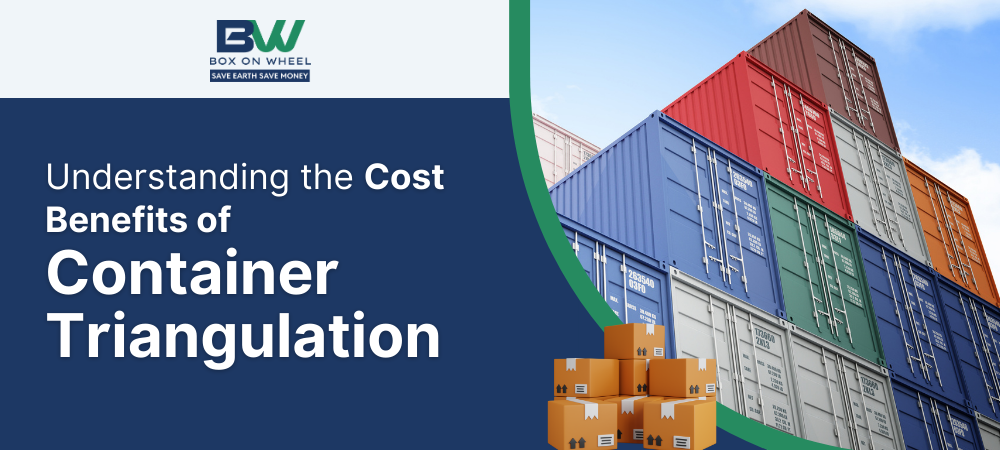“Street turns” or container triangulation is an innovative logistics strategy that makes optimal use of shipping containers by minimizing empty return journeys. While this will result in better operational efficiency, it also makes huge cost savings and environmental benefits, particularly for India’s fast-growing logistics sector.
Why Are Empty Containers A Major Challenge
Typically, 40% of the shipping containers, on their return journeys, come back empty after delivering merchandise to a destination, resulting in massive inefficiencies. In India, which is expected to grow logistics by 4.5% year-to-year till 2050, reducing empty container returns is the need of the hour.
According to the World Shipping Council, around 20% of all container movements are empty, which often lead to higher operational costs and carbon emissions. It is estimated that 60 million empty containers are moved around the globe annually. That should translate into unnecessary consumption of fuel and pollution.
The use of container triangulation will ensure the availability of containers for immediate use in exports instead of traveling back empty, thus reducing the number of empty trips.
Cost Savings through Container Triangulation
Container triangulation cost implications are very high. Studies found that businesses can obtain as much as 30% logistics cost saving if containers are re-used immediately for exports. In general, operators using triangulation point reported the following savings:
- 11% to 14% on trucking costs
- 8% to 10% in lead time savings, which refers to time taken to deliver products
For instance, a study by the top logistic company found that combining effective inland services with triangulation could reduce indirect transport and logistics costs by an average of 20% to 26% for shippers using their services across key transport corridors in India. This translates into a net reduction in transportation and logistics costs of up to 6%, significantly enhancing profitability.
Environmental Benefits
Beyond cost savings, container triangulation is integral to reducing the ecological footprint of logistics operations. It reduces empty trips that burn more fuel and therefore increase CO₂ emissions by up to 20% per trip. This is critical because transporting empty containers is one of the biggest sources of greenhouse gas emissions. For example, a vehicle that would otherwise make an empty return trip can now help cut down on approximately 12.5 metric tons of carbon emissions annually.
The shift towards greener logistics not only helps companies comply with increasing environmental regulations but also boosts their reputation among environmentally conscious consumers. Companies adopting sustainable practices can enhance their brand image while realizing substantial savings on fuel costs.
Operational Efficiency
Container triangulation increases efficiency during operations as containers do not go redundant for long. This approach reduces turnaround times drastically; some businesses have reduced their average time that a container takes to turn around from 34 days to just 4 days. These benefits enable businesses to service more customers and add value to income streams.
However, efficient coordination between multiple stakeholders, such as transporters, exporters, importers, and third-party logistics providers is a must for successful execution. Advanced technologies like IoT devices and data analytics play a crucial role in making seamless operations possible through provision of real-time tracking and optimized routing based on cargo availability.
Challenges and Considerations
Benefits of container triangulation, though obvious, bring along several challenges with its implementation. Some of these are:
Complex Coordination
There is the need for effective coordination with diverse parties to make triangulation successful.
Technology dependency
The strategy is highly dependent on sophisticated technologies; failure of integration might affect operations
Regulatory issues
Transfer of containers between owners, for immediate reuse, sometimes may bring about regulatory problems
Initial Implementation Costs
Upfront investment in technology and training may not be financially feasible for some businesses.
Despite these, partnerships with specialized logistics companies in India like the Box on Wheel can help streamline operations and capitalize on the benefits of triangulation. Such companies specialize in logistics coordination and integration with technology, thus helping the business to maximize efficiency at lower costs.
Conclusion
Container triangulation is a revolutionary approach under India’s logistics management. Optimizing container usage and eliminating empty trips contribute not only to large-scale cost savings but also reduce carbon emissions, thereby fostering sustainability. As the India logistics landscape continues to evolve, innovative strategies like container triangulation will be the key for businesses to remain competitive in a global market that focuses more and more on efficiency and environmental responsibility.
Speak with our team now to simplify your container logistics. Call us today!

